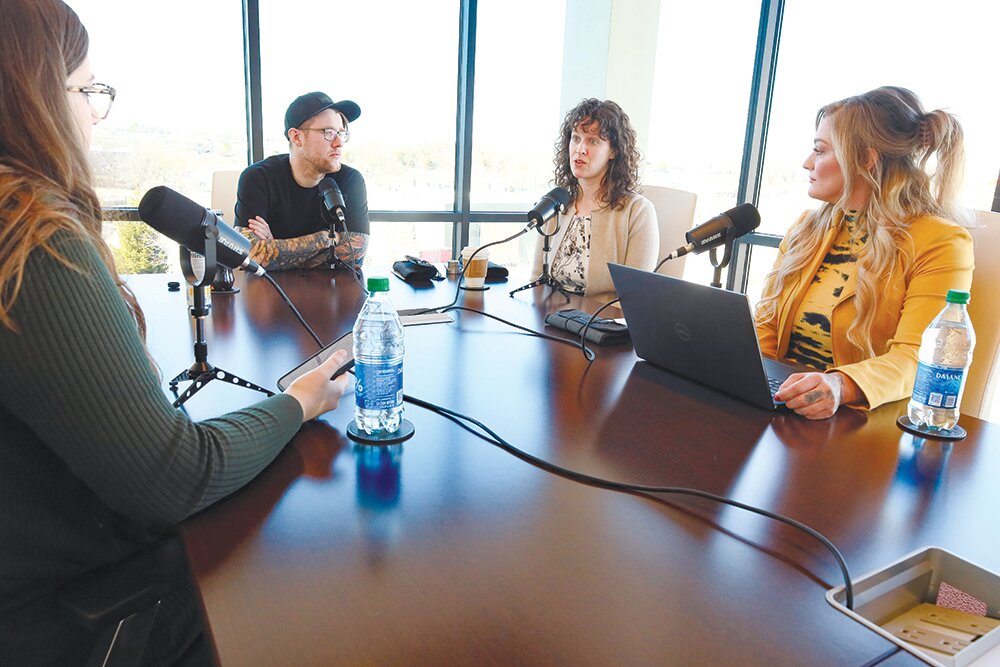YOUR BUSINESS AUTHORITY
Springfield, MO
YOUR BUSINESS AUTHORITY
Springfield, MO

Each month, we gather around the table with a different group of Springfield business leaders to discuss industry trends, workforce and company operations. Join us as we get a behind-the-scenes look into our business community from the C-suite.
Springfield Business Journal Executive Editor Christine Temple discusses the technology industry with Myke Bates, CEO and co-founder of Hearo Technologies LLC, which develops remote support systems for people with disabilities; Maranda Provance, director of development for digital agency Mostly Serious LLC; and Simoriah Stogner, senior manager of technology services at Jack Henry & Associates Inc., a technology provider for financial institutions.
An excerpt from the start of the podcast follows.
Christine Temple: You all represent different sectors of the tech industry. Can you talk about some of the advancements in your field that are most impacting your work?
Maranda Provance: I think this is probably happening across all the sectors, but AI is definitely the big thing that stands out. People are trying to find the best ways to integrate it into their workflows. We do AI trainings at Mostly Serious, and we’ve had a lot of interest from companies looking for custom training specific to their employees and how they can best utilize across their company.
Myke Bates: As far as AI goes, I’ve been a little bit of a curmudgeon. I get it. GPT hit the scene and it’s the most incredible thing on the face of the earth, right? But I can’t help but be bothered a little bit by just the oversaturation and the buzz-wordiness of AI. I feel like I’ve just naturally been a little bit on the outside of learning it but went through an exercise in the past week or so when we’ve been applying for a grant. I’ve been using ChatGPT for well over a year now, but seeing the capabilities in that custom GPT realm, that’s so huge. I feel like I’m a year late to the party going, yeah, I totally see this.
Simoriah Stogner: For my sector, we’ve had some challenges with the acceleration of digital transformation. So, when you think about how personal service and experiences have accelerated toward self-service with our industry – so thinking about financial services providers – the more that digital transformation was adopted in the financial fintech services area, as well as just banking, we started to see fragmentation happening. We found that 20 to 30 different accounts are being managed by each individual American consumer. All of that is triggered from this digital transformation where we’re experiencing fragmentation.
Bates: How many?
Stogner: Twenty to 30 accounts per person. So, we’re talking about banking, checking, savings, investments, business management, personal account management, all of those different things could be associated to one individual human. Generally, I would say the obsession for self-service drove this big digital transformation opportunity, and then that created fragmentation in our marketplace. So, that fragmentation then made it even more challenging for our consumers to see a complete picture of their financial portfolio.
Bates: I’m blown away by the 20 to 30 accounts.
Provance: Just in financial tools?
Stogner: Yes. Check out your personal portfolio. If you’re managing an IRA or a 401(k) account or you’re managing stocks, all of that stuff adds up. And potentially we have the ability to select different financial services or different providers for each of those pieces of our portfolios.
Temple: So, while all of us are counting up our accounts, I want to go back to AI because it does seem like the self-service digital transformation that you’re talking about, AI is allowing more of that, too. People are getting access to more information and they’re able to do more themselves with this co-pilot type technology. Can you talk about the ways or how you have seen businesses utilize AI and opportunities in the future?
Provance: What we are seeing a lot with our customers, and actually working on some projects with current customers, is providing ways to be able to use a ChatGPT-style communication that knows their documents. We’ve talked to companies about this in the realm of (human resources), big corporations that have a lot of policies, a lot of documentation, and have a hard time staffing enough people to manage support calls for their employees, providing a customized ChatGPT-style bot that knows their policies, that knows their HR documents, and people could maybe start there first. Again, pointing back to that desire to self-service.
Temple: So, essentially the AI bot will just learn from specific information that you feed it, so you can ask, how many sick days do I get in my second year of employment?
Provance: Yes, exactly.
Provance: And then on the customer-facing side, too, so we’re working with some visitors bureaus and they want to give people a tool to be able to plan their trip in the area they’re promoting, so we can feed it the documents specifically on that visitor bureau site and allow the person to get a much better response than they would just going to straight ChatGPT, or even just using the web browsing. And then it also helps that business point that person back to resources on their site and potentially businesses that they promoted and have deals with.
Springfield Business Journal’s annual Day in the Life feature is back, this time taking you into the day of a health care leader, school district superintendent and brewery owner.